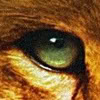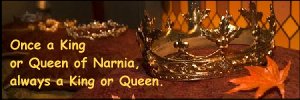Why mythology in Narnia?
Moderators: coracle, Lady Arwen
24 posts • Page 1 of 2 • 1, 2
Why mythology in Narnia?
Hello,
Last week somebody asked me why C.S. Lewis uses some strange mytholical creatures in Narnia. For instance, when a faun in the myths plays his pan flute it didn't have very good plans (something to do with sexual immorality). As you al know this also happens when Tumnus plays his narnian lullaby for Lucy.
So i wonder why does C.S. Lewis combine a beautiful story of forgiving and the resurrection of Aslan(which can be explained as a allegory of the bible) with some myths that can be explained as bad and immoral?
Greetings
Last week somebody asked me why C.S. Lewis uses some strange mytholical creatures in Narnia. For instance, when a faun in the myths plays his pan flute it didn't have very good plans (something to do with sexual immorality). As you al know this also happens when Tumnus plays his narnian lullaby for Lucy.
So i wonder why does C.S. Lewis combine a beautiful story of forgiving and the resurrection of Aslan(which can be explained as a allegory of the bible) with some myths that can be explained as bad and immoral?
Greetings
- veritas

- Posts: 5
- Joined: Oct 17, 2009
- Gender: Male
Re: Why mythology in Narnia?
This topic has the potential to stray into some pretty adult stuff, please do your best to keep this topic family-friendly. Thanks! 

-

fantasia 
- The Watchful Admin
- Posts: 18908
- Joined: Feb 06, 2004
- Location: Kansas
- Gender: Female
Re: Why mythology in Narnia?
This is a great question, and I look forward to the discussion it will bring. Definitely, let's discuss how Lewis "redeemed" pagan mythology by using it as he did, but let's not explore the explicit elements of that mythology. Remember we have a lot of young members here!
I know some people have really struggled with the problem of pagan mythology in the Chronicles — some so much that they have decided to stop reading the Narnia books altogether. I respect that as a Romans 14 issue; some things we consume are not wrong in themselves, but if we believe they are wrong and still partake of them, we are violating our conscience and that is sin. But others may partake of such things and not be troubled by stirrings of conscience, and so it is fine for them.
Personally, I love what Lewis did with mythology in the Chronicles. He took something that had been corrupted and reworked it to create something wholesome and good. Isn't that a small glimpse of what God is eventually going to do with Earth? He's going to take something that has been corrupted and rework it to create the New Heavens and the New Earth. This isn't to over-glorify what Lewis did with Narnia, but rather to point to the awesomeness of our God
I know some people have really struggled with the problem of pagan mythology in the Chronicles — some so much that they have decided to stop reading the Narnia books altogether. I respect that as a Romans 14 issue; some things we consume are not wrong in themselves, but if we believe they are wrong and still partake of them, we are violating our conscience and that is sin. But others may partake of such things and not be troubled by stirrings of conscience, and so it is fine for them.
Personally, I love what Lewis did with mythology in the Chronicles. He took something that had been corrupted and reworked it to create something wholesome and good. Isn't that a small glimpse of what God is eventually going to do with Earth? He's going to take something that has been corrupted and rework it to create the New Heavens and the New Earth. This isn't to over-glorify what Lewis did with Narnia, but rather to point to the awesomeness of our God

"It is God who gives happiness; for he is the true wealth of men's souls." — Augustine
-

wisewoman 
- The Moddess of Sentence Surgery
- Posts: 10352
- Joined: Jun 01, 2005
- Location: Western Wild
Re: Why mythology in Narnia?
veritas wrote:So i wonder why does C.S. Lewis combine a beautiful story of forgiving and the resurrection of Aslan(which can be explained as a allegory of the bible) with some myths that can be explained as bad and immoral?
Whilst Greek and Roman mythology might have elements in it you would consider immoral, it also embodied the dominant belief system of the Roman empire when Jesus was born in Roman Judea, the belief system which eventually gave way to Christianity. Hence why Greek and Roman mythology is an appropriate setting for Lewis' story of Aslan.
Some of those myths were ripping good yarns, if you leave out the saucy bits, which is what C.S.Lewis did. For example, the 12 labours of Hercules, or the stories of heroes like Perseus or Jason, the Argonaut, have entertained generations of children well before Christ was born, way back in the time of the Persian invasions of Greece, under Xerxes, AKA Ahasuerus, Esther's husband. Homer's Iliad and Odyssey were actually studied in Ancient Greek and Roman schools, as well as more modern ones. Archaeology has shown that Troy and Mycenae actually existed, much as Minoan Crete did, and that these early Greek civilizations were also displaced by the later Sea Peoples related to the Biblical Philistines. But nobody knows who Homer was, the author of the Iliad and the Odyssey.
-

waggawerewolf27 
- Posts: 8781
- Joined: Sep 25, 2009
- Location: Oz
- Gender: Female
Re: Why mythology in Narnia?
There are many, many similarities between pagan mythologies and religions and Christianity. There are a few ways of explaining this. Myths could have sprung from a primitive human tendency to deify nature and explain origins and fate and that sort of thing. That's a part of it, I think, but it leaves out the spiritual aspect of mythology, and therefore the real essence of the myth. Among Christians I have personally experienced two ways of treating the similarities between myth and Christianity:
1. Mythology is a demonic perversion of Scriptural truth
2. Mythologies bear by Divine Grace the imprint of the True Myth
The second way is the way I treat it myself. I believe that God Himself worked in and through the minds of the poets, and put his Gospel in the myths of every tribe and nation. It was either Chesterton or Lewis himself (I can't remember which) who said that mythology was God looking into the minds of the poets and using the images that he found there.
Tolkien too, believed that great power was invested in myth, but that as long as it remained unsanctified it was dangerous. Tolkien and Lewis both gave us sanctified myths--myths turned to God's purposes.
St. Augustine wrote about signs and symbols in his On Christian Doctrine. I don't have the book in front of me, but the basic thrust of his message was that a sign was a lesser thing intended to point to and magnify the greater, never to be worshipped for itself. In this sense, we, and all the world are signs--we are never to love anyone or anything for themselves; God is the only one who is to be enjoyed in that sense. All other things are to point us to Him. Myth should be treated the same way. If Myth is effective for pointing you to God and his glory, then use it. But if you can't handle the sign, if you find yourself looking to the lesser thing rather than the greater, by all means leave off the use of it.
1. Mythology is a demonic perversion of Scriptural truth
2. Mythologies bear by Divine Grace the imprint of the True Myth
The second way is the way I treat it myself. I believe that God Himself worked in and through the minds of the poets, and put his Gospel in the myths of every tribe and nation. It was either Chesterton or Lewis himself (I can't remember which) who said that mythology was God looking into the minds of the poets and using the images that he found there.
Tolkien too, believed that great power was invested in myth, but that as long as it remained unsanctified it was dangerous. Tolkien and Lewis both gave us sanctified myths--myths turned to God's purposes.
St. Augustine wrote about signs and symbols in his On Christian Doctrine. I don't have the book in front of me, but the basic thrust of his message was that a sign was a lesser thing intended to point to and magnify the greater, never to be worshipped for itself. In this sense, we, and all the world are signs--we are never to love anyone or anything for themselves; God is the only one who is to be enjoyed in that sense. All other things are to point us to Him. Myth should be treated the same way. If Myth is effective for pointing you to God and his glory, then use it. But if you can't handle the sign, if you find yourself looking to the lesser thing rather than the greater, by all means leave off the use of it.
- Gladius

- Posts: 152
- Joined: Jun 11, 2007
Re: Why mythology in Narnia?
Great topic veritas. 


I would state just two points quickly, as the discussion is somewhat nascent currently.
First of all, as Gladius pointed out, the idea of myth was central to both Lewis and Tolkien. You can see many similarities between the stories. Both LOTR and the CON had Creation "sung" into being. Both had figures that suffered and died, albeit, a servant of God in LOTR, and God Himself in the CON. Both had unlikely heroes making incredible journeys to save the day, in which they learned important lessons, and were guided by the Creator Himself in some way. The list could go on. Such notions are replete throughout mythology.
Also, Lewis himself believed it possible that the myths were true to some extent, in that some beings did exist, and were falsely worshipped by various pagan cultures throughout humanity. Thus, his use of Bacchus in PC and of Lilith in LWW was not surprising. He viewed these as potentially true, and corrupted by men.
Moreover, it was the appeal to "faerie", and mythology, that Tolkien and other close friends of Lewis at Oxford used to help draw him to Christ.
I will wrap up by pointing out that, in a way, Lewis was just acknowledging Scriptural authority itself. The famous incidences of the Apostle Paul appealing to the pagan myths at Mars Hill. My chaplain in Iraq would talk to me a lot, and we would discuss how there are instances of Paul using language, ideas, and what not, that would have directly appealed to the pagan understandings of his readers and listeners. He used this imagery to point to the Truth Himself, Jesus Christ.
Well that's it for me now. Good topic all. I can't wait to see how it all turns out.


I bid you all adieu.



I would state just two points quickly, as the discussion is somewhat nascent currently.
First of all, as Gladius pointed out, the idea of myth was central to both Lewis and Tolkien. You can see many similarities between the stories. Both LOTR and the CON had Creation "sung" into being. Both had figures that suffered and died, albeit, a servant of God in LOTR, and God Himself in the CON. Both had unlikely heroes making incredible journeys to save the day, in which they learned important lessons, and were guided by the Creator Himself in some way. The list could go on. Such notions are replete throughout mythology.
Also, Lewis himself believed it possible that the myths were true to some extent, in that some beings did exist, and were falsely worshipped by various pagan cultures throughout humanity. Thus, his use of Bacchus in PC and of Lilith in LWW was not surprising. He viewed these as potentially true, and corrupted by men.
Moreover, it was the appeal to "faerie", and mythology, that Tolkien and other close friends of Lewis at Oxford used to help draw him to Christ.
I will wrap up by pointing out that, in a way, Lewis was just acknowledging Scriptural authority itself. The famous incidences of the Apostle Paul appealing to the pagan myths at Mars Hill. My chaplain in Iraq would talk to me a lot, and we would discuss how there are instances of Paul using language, ideas, and what not, that would have directly appealed to the pagan understandings of his readers and listeners. He used this imagery to point to the Truth Himself, Jesus Christ.
Well that's it for me now. Good topic all. I can't wait to see how it all turns out.



I bid you all adieu.

The surest way for evil to triumph in the world is for good men to do nothing. - Sir Edmund Burke
Avvy and sig by Erucenindë.
-

MereChristian 
- Posts: 675
- Joined: Dec 29, 2005
- Location: United States
Re: Why mythology in Narnia?
I can understand that Lewis did combine mythology with the bible to make a beatiful story. I always saw it as a paralell to us not being good by ourselves and needing God to do good things in our lives. If we cant do good things by ourselves the same aplies to centaurs and fauns. They are not good by themselves and need Aslan in their lives.
But that leaves the part of Tumnus playing the pan flute. Which was an evil ritual. I cant really make much out of that and i wonder if any of you might have an explanation for why Lewis did use this in his story. Maybe an explanation is that at the time Tumnus plays his flute he has bad plans with Lucy and he falls into old "sins"?
Like to hear what you think.
But that leaves the part of Tumnus playing the pan flute. Which was an evil ritual. I cant really make much out of that and i wonder if any of you might have an explanation for why Lewis did use this in his story. Maybe an explanation is that at the time Tumnus plays his flute he has bad plans with Lucy and he falls into old "sins"?
Like to hear what you think.
- veritas

- Posts: 5
- Joined: Oct 17, 2009
- Gender: Male
Re: Why mythology in Narnia?
Tumnus played the pan flute because that's what fauns do. And he did have evil intentions. He meant to turn Lucy over to the White Witch, the daughter of Lilith--what's worse than that? He was a fallible creature, bent to the will of the Witch. So your question really becomes, "Why is there evil in Narnia at all?" I have actually met people who have said things like, "I just can't understand why a good Christian man like C.S. Lewis would write a book about a witch." Which--pun intended--sounds to me just as ridiculous as asking why a good Christian man like St. Paul would talk about the devil in Ephesians. The answer to both questions is this: evil is real. And it is sheer idiocy to pretend that it doesn't.
- Gladius

- Posts: 152
- Joined: Jun 11, 2007
Re: Why mythology in Narnia?
When I read this topic, I instantly had to research online and see what online resources have to say about mythology and Narnia. I'm not quite sure what to think, but here's my two cents. (Or three cents. I have so much to say that I'm not sure if I'm going to manage to keep my thoughts straight!  )
)
I believe borrowing from mythology, as Lewis did, is almost essential to making a believable fantasy world. He was a professor and knew a lot of ancient mythology. Many, if not all fairy tales that we know involve mythological creatures such as unicorns or fauns. Who ever heard of a fantasy world that really had the taste of a different world to it, if the only animals there were cats and dogs and horses? For example, The Lord of the Rings has hobbits, Dwarfs, and Elves. Elves are rooted in Germanic mythology and have magical powers. Does that mean we should not read these stories? Rather, Elves are classic literary characters. Same with unicorns, like Jewel in The Last Battle.
Reading the scene between Lucy and Mr. Tumnus, keeping it in context, what comes to my mind? Does it come into my mind that Mr. Tumnus has evil plans for Lucy (other than turning her over to the White Witch)? Or does it come into my mind that he is playing an enchanting song before he takes her to the White Witch? What is Lewis's intention by the scene? We do not want to take it out of context and make it seem like something it is entirely not.
I hope that makes sense... I'm in a bit of a rush.
 )
)I believe borrowing from mythology, as Lewis did, is almost essential to making a believable fantasy world. He was a professor and knew a lot of ancient mythology. Many, if not all fairy tales that we know involve mythological creatures such as unicorns or fauns. Who ever heard of a fantasy world that really had the taste of a different world to it, if the only animals there were cats and dogs and horses? For example, The Lord of the Rings has hobbits, Dwarfs, and Elves. Elves are rooted in Germanic mythology and have magical powers. Does that mean we should not read these stories? Rather, Elves are classic literary characters. Same with unicorns, like Jewel in The Last Battle.
Reading the scene between Lucy and Mr. Tumnus, keeping it in context, what comes to my mind? Does it come into my mind that Mr. Tumnus has evil plans for Lucy (other than turning her over to the White Witch)? Or does it come into my mind that he is playing an enchanting song before he takes her to the White Witch? What is Lewis's intention by the scene? We do not want to take it out of context and make it seem like something it is entirely not.
I hope that makes sense... I'm in a bit of a rush.
-

Lady Galadriel 
- Posts: 597
- Joined: Oct 25, 2009
- Gender: Female
Re: Why mythology in Narnia?
because, behind the tatters and bits of mythology is the real world.
"Sneaking bits of truth past the watchful Uruloki at the sunday school door."
Forgetting for the moment that middle earth is a whole cloth and Narnia is a patchwork, there is a recurring theme in both Lewis and Tolkien regarding the "rediscovery" of the truth of ancient things that we call "mythical" or "legendary" simply because they aren't presently walking down main street.
That is why "eustace had only read the wrong sort of books". That is why Studdock's education is neither scientific nor classical "but merely modern". That is why Miraz wants to wipe even the MEMORY of there ever having been an "old narnia." In having no real knowledge of the past, they are both unable to accept or deal with it when it rears its hoary carcass in their path.
The bible is too familiar a work, and even THAT is quite circumscribed. Modern missionaries are usually trained in the cultures they work for at least to some extent. I think Lewis and Tolkien expected that the day would come when rather more would have to be "dealt with" than the narrow mindset of "western christianity". The rest of the christian world knows all about these things just as Lewis did being "a converted pagan living among apostate christians". But everyone will someday have to face up to their own "Caspian Moment."
Then it will be a question of will we want to join this wider world. Or will we be holed up like Miraz' nobles, cowering in our castles and insisting reality conform to our limited knowledge and narrow theories.
To amplify wht MereChristian says, not only the false gods, but the very real eldila too. That is why on the one hand we have Genesis 6:1-3, and on the other hand we have Beren/Luthien and Caspian/Ramandu's daughter. Not all trans-unions are evil. That was a real corker when I pointed it out to Michael Heiser some years ago. He had to call in his resident expert Doug Vardell before he would belive me.
When did anyone ever hear of a witch who could lob nuclear weapons? Jadis isn't some old hag with a black pot and a bunch of herbs.
The eldar dont make toys at the north pole. Rather they are this worlds first high technology race. (Following the non-corporeal Valar who built the place.) After the age of Hurin, men fell from wisdom, and worshipped them, forgetting the greater reality. And some of the elves fell too.
The eldila and oyarsi who manage and oversee deep heaven.
None of this rings a bell? Great Chain of Being?
Even humans watch this great dance via their essences like great personages contemplating a chessboard. We have mistaken the chessboard for the whole of reality. People read the Perelandra etc. but it never seems to click.
na alye vinya loa.... may the new year be blessed.
"Sneaking bits of truth past the watchful Uruloki at the sunday school door."
Forgetting for the moment that middle earth is a whole cloth and Narnia is a patchwork, there is a recurring theme in both Lewis and Tolkien regarding the "rediscovery" of the truth of ancient things that we call "mythical" or "legendary" simply because they aren't presently walking down main street.
That is why "eustace had only read the wrong sort of books". That is why Studdock's education is neither scientific nor classical "but merely modern". That is why Miraz wants to wipe even the MEMORY of there ever having been an "old narnia." In having no real knowledge of the past, they are both unable to accept or deal with it when it rears its hoary carcass in their path.
The bible is too familiar a work, and even THAT is quite circumscribed. Modern missionaries are usually trained in the cultures they work for at least to some extent. I think Lewis and Tolkien expected that the day would come when rather more would have to be "dealt with" than the narrow mindset of "western christianity". The rest of the christian world knows all about these things just as Lewis did being "a converted pagan living among apostate christians". But everyone will someday have to face up to their own "Caspian Moment."
Then it will be a question of will we want to join this wider world. Or will we be holed up like Miraz' nobles, cowering in our castles and insisting reality conform to our limited knowledge and narrow theories.
To amplify wht MereChristian says, not only the false gods, but the very real eldila too. That is why on the one hand we have Genesis 6:1-3, and on the other hand we have Beren/Luthien and Caspian/Ramandu's daughter. Not all trans-unions are evil. That was a real corker when I pointed it out to Michael Heiser some years ago. He had to call in his resident expert Doug Vardell before he would belive me.
When did anyone ever hear of a witch who could lob nuclear weapons? Jadis isn't some old hag with a black pot and a bunch of herbs.
The eldar dont make toys at the north pole. Rather they are this worlds first high technology race. (Following the non-corporeal Valar who built the place.) After the age of Hurin, men fell from wisdom, and worshipped them, forgetting the greater reality. And some of the elves fell too.
The eldila and oyarsi who manage and oversee deep heaven.
None of this rings a bell? Great Chain of Being?
Even humans watch this great dance via their essences like great personages contemplating a chessboard. We have mistaken the chessboard for the whole of reality. People read the Perelandra etc. but it never seems to click.
na alye vinya loa.... may the new year be blessed.
-

Elluinas Mirion 
- Posts: 23
- Joined: Dec 24, 2009
- Location: according to ML, on "Cloud 9"
Re: Why mythology in Narnia?
Lady Galadriel wrote:Reading the scene between Lucy and Mr. Tumnus, keeping it in context, what comes to my mind? Does it come into my mind that Mr. Tumnus has evil plans for Lucy (other than turning her over to the White Witch)? Or does it come into my mind that he is playing an enchanting song before he takes her to the White Witch? What is Lewis's intention by the scene? We do not want to take it out of context and make it seem like something it is entirely not.
What comes to my mind is that he's playing a lullaby, and as soon as Lucy's fallen asleep, he'll carry her off to the White Witch. No more no less.
Lewis changes his mythological characters in Narnia. They are not the same as their Greek equivalents. Narnian Fauns are "ordinary people", they love music and flute playing, and they love dancing (especially with the Dryads) - apart from that, some of them are good people and others make dreadful mistakes (like Tumnus who enters the service of the White Witch). Greek Fauns are different - it wouldn't be wise to go home to one of them for tea.
Centaurs are even more different. Greek Centaurs were sometimes not much better than Greek Fauns, whereas Narnian Centaurs are noble creatures, full of wisdom, sharing their wisdom with the Kings, and generally highly respected.
As to why he would have Fauns in Narnia - they were part of what started it all. Lewis had had an image in his head for years - an image of a Faun in the snow, carrying parcels. Eventually he wrote a story about it, including other images he had. And he mixed it with everything that could fit into fairy-tales, not looking to mythology only.
-

Varnafinde 
- Princess of the Noldor and Royal Overseer of the Talk About Narnia forum
- Posts: 2377
- Joined: Jul 13, 2005
- Location: Western Wild
- Gender: Female
Re: Why mythology in Narnia?
I simply think that C.S. Lewis thinks it is fine for Christians to believe in creatures like fauns and faeries. That fantasy and sci-fi do not conflict with Christian values. That there can be representations of the spirits of natural beings (such as a river or tree), but that they are still creatures and not deities.
-

Aravis Narnia 
- Posts: 4546
- Joined: Oct 09, 2009
- Location: Florida
- Gender: Female
Re: Why mythology in Narnia?
veritas wrote:So i wonder why does C.S. Lewis combine a beautiful story of forgiving and the resurrection of Aslan(which can be explained as a allegory of the bible) with some myths that can be explained as bad and immoral?
In my opinion, I don't think it's supposed to be an allegory. People make comparisons, but that's about it.
And personally I think the mythology is there to stir people's imaginations. It would be a pretty lame fantasy world without mythical creatures.
And I don't think everything in Narnia was morally upright either (although I imagine it being more so than Earth).

-

TheGeneral 
- Posts: 566
- Joined: Sep 06, 2009
- Location: Playing hockey
- Gender: Female
Re: Why mythology in Narnia?
Varnafinde wrote:Greek Fauns are different - it wouldn't be wise to go home to one of them for tea.
Well, not that different, really. It wasn't really safe for Lucy to go home to one of them for tea, and it was only because Tumnus saw the error of his ways that there was a different outcome, and Lucy got to be friends with him, instead. In Prince Caspian Susan and Lucy thought some of the characters caught up with the Narnia Romp were not too safe to be alone with. It is only because Aslan is with them that the likes of Bacchus were held in check.
I think that in many cultures mythology, whether Greek and Roman or the tales of the Dreamtime, is used to entertain and instruct children about the world around them, by using their imaginations.
-

waggawerewolf27 
- Posts: 8781
- Joined: Sep 25, 2009
- Location: Oz
- Gender: Female
Re: Why mythology in Narnia?
waggawerewolf27 wrote:Varnafinde wrote:Greek Fauns are different - it wouldn't be wise to go home to one of them for tea.
Well, not that different, really. It wasn't really safe for Lucy to go home to one of them for tea, and it was only because Tumnus saw the error of his ways that there was a different outcome, and Lucy got to be friends with him, instead.
But he was dangerous not because he was a Faun, but because he had taken service with the White Witch - or am I seeing Narnian Fauns as too innocent?
-

Varnafinde 
- Princess of the Noldor and Royal Overseer of the Talk About Narnia forum
- Posts: 2377
- Joined: Jul 13, 2005
- Location: Western Wild
- Gender: Female
Re: Why mythology in Narnia?
In regards to the question of the placement of fauns in the Chronicles, I think that at least within Lewis's work each type of creature has the choice to be good or bad, not have this determined by what type of creature they happen to be (eg. LWW has evil dwarves and minotaurs, however they end up being, in the majority, on Aslan's side in PC).
The inclusion of myth seems based on the Tolkienien idea of Eucatastrophe. All good myths or fairy tales have an element of Eucatastrophe according to Lewis and Tolkien, and in this element reflect the "True Myth" of the gospel.
The presence of "gods"(lower case "g") in the Chronicles is not neccesarily a non-christian inclusion. There was a doctrine of the Catholic Church in the middle ages that what the pagan cultures interpreted as gods were mearly the seven arch-angels or demons trying to impersonate these angels. The Space Trilogy showed this aspect of Lewis's worldview. In That Hideous Strength Lewis suggests that the Oyarsi of the planets are the equivalent of the arch-angels and the suggestion of the "wraiths" that are evil. This doctrine that the pagan religions belief in the gods is mearly the misinterpretation of the arch-angels or the influences of the "wraiths" I would say is not neccesarily doctrinally incorrect. The almost-apocriphal book of Enoch supports this interpretation (Enoch is quoted in the book of Jude). This tells of the events surrounding the birth of the Nephilim.
It is, in my opinion, important to note the possible view of Tolkien and Lewis that the flaw in the birth of the Nephilim was the marriage of angel and man without an intervening generation. In Tolkien Beren does not marry the maia Melian but her daughter Luthien who was half-elf (not entirely Maia). In the Chronicles Caspian does not marry a star, but a star's daughter. The one part that might be questionable along this chain of reasoning is the marriage of Adam to Lilith.
The inclusion of myth seems based on the Tolkienien idea of Eucatastrophe. All good myths or fairy tales have an element of Eucatastrophe according to Lewis and Tolkien, and in this element reflect the "True Myth" of the gospel.
The presence of "gods"(lower case "g") in the Chronicles is not neccesarily a non-christian inclusion. There was a doctrine of the Catholic Church in the middle ages that what the pagan cultures interpreted as gods were mearly the seven arch-angels or demons trying to impersonate these angels. The Space Trilogy showed this aspect of Lewis's worldview. In That Hideous Strength Lewis suggests that the Oyarsi of the planets are the equivalent of the arch-angels and the suggestion of the "wraiths" that are evil. This doctrine that the pagan religions belief in the gods is mearly the misinterpretation of the arch-angels or the influences of the "wraiths" I would say is not neccesarily doctrinally incorrect. The almost-apocriphal book of Enoch supports this interpretation (Enoch is quoted in the book of Jude). This tells of the events surrounding the birth of the Nephilim.
It is, in my opinion, important to note the possible view of Tolkien and Lewis that the flaw in the birth of the Nephilim was the marriage of angel and man without an intervening generation. In Tolkien Beren does not marry the maia Melian but her daughter Luthien who was half-elf (not entirely Maia). In the Chronicles Caspian does not marry a star, but a star's daughter. The one part that might be questionable along this chain of reasoning is the marriage of Adam to Lilith.
-

Olorin55 
- Posts: 7
- Joined: Jan 10, 2010
- Gender: Male
24 posts • Page 1 of 2 • 1, 2
Who is online
Users browsing this forum: No registered users and 1 guest
